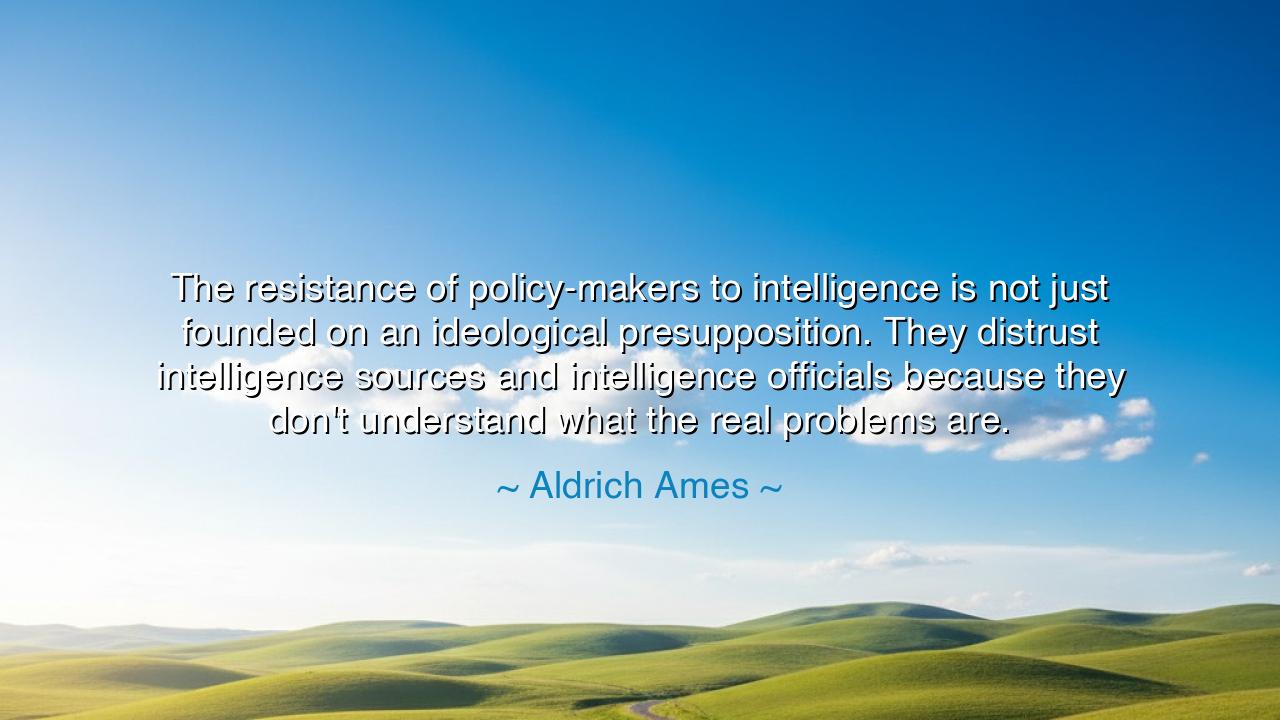
The resistance of policy-makers to intelligence is not just
The resistance of policy-makers to intelligence is not just founded on an ideological presupposition. They distrust intelligence sources and intelligence officials because they don't understand what the real problems are.





“The resistance of policy-makers to intelligence is not just founded on an ideological presupposition. They distrust intelligence sources and intelligence officials because they don’t understand what the real problems are.” Thus spoke Aldrich Ames, the spy who betrayed his nation and yet, in a moment of dark clarity, revealed a truth that reaches beyond espionage and politics — a truth about knowledge, fear, and the blindness of power. His words are not the boast of a traitor, but the lament of one who saw the inner workings of empires and understood that even the mightiest governments are crippled by ignorance disguised as certainty. It is a confession both tragic and wise, for it exposes the eternal chasm between those who know and those who command.
In his statement, Ames unveils a paradox of authority: those who wield power are often the least equipped to understand the subtleties that sustain it. Policy-makers, wrapped in the armor of ideology and self-assurance, resist the truths that intelligence reveals — not because the information is false, but because it is inconvenient, uncomfortable, or too complex for their narrow vision. They dwell in the light of public perception, while the intelligence officer moves through the twilight of hidden realities. Between these two realms lies mistrust, the seed of misjudgment that has undone kings and presidents alike.
So it was in the days of Troy, when Cassandra, blessed by the gods with the gift of prophecy, warned her people of their doom. She spoke truth, but because her truth was bitter, the rulers of Troy dismissed her as mad. The horse stood at the gate, gleaming with false promise, and the wise were silenced. Thus, the city fell — not from the strength of its enemies, but from its leaders’ refusal to heed what they did not understand. So too has it been in every empire since. When leaders reject the insight of those who see deeper than they, they build their own destruction with hands proud and blind.
Ames, in his dark way, witnessed this cycle within the heart of modern power. As a CIA officer turned double agent, he lived at the nexus of truth and deception, where intelligence sought to illuminate and politics sought to obscure. His observation — that policy-makers “don’t understand what the real problems are” — is not merely about governments, but about the human condition itself. For the same blindness afflicts all who mistake authority for wisdom, all who choose comfort over comprehension. The intellect without humility becomes arrogance; the power without understanding becomes tyranny.
Consider the tale of Galileo, who looked to the heavens and saw the earth moving around the sun. His instruments revealed what the Church refused to believe. The policy-makers of his time — the high priests of dogma — feared that truth would unravel their order. They silenced him, but the stars did not change their course. Like the rulers Ames spoke of, they distrusted intelligence not because it was wrong, but because they could not bear what it meant. And thus, for centuries, humanity’s understanding of the cosmos was held hostage to ideology.
The message that breathes within Ames’s words, then, is both warning and call. Knowledge is a weapon more potent than armies, yet it demands a mind capable of wielding it with humility and courage. To distrust knowledge because it threatens one’s comfort is to turn one’s back on truth itself. The wise leader, whether of nations or of one’s own life, must learn to listen — to question their own assumptions, to seek counsel from those who see beyond the surface. The fool, by contrast, clings to certainty and perishes in ignorance.
Therefore, O seeker of wisdom, learn from this grim oracle. When truth knocks at your door, do not demand that it flatter your beliefs before you open. When counsel comes from the quiet and the hidden, do not dismiss it for lack of grandeur. The real problems of life and governance lie not in what is seen, but in what is overlooked — in the invisible forces of pride, fear, and willful blindness. To overcome them, one must cultivate understanding before action, listening before judgment, and humility before command.
For the downfall of nations begins not with enemies abroad, but with deafness within. Let Ames’s words, however born of betrayal, serve as a warning for all who lead — whether the world, a people, or one’s own destiny. Distrust not knowledge, but your own blindness to it. Seek understanding, and in that seeking, you will wield power not as a tyrant of ignorance, but as a guardian of truth.






AAdministratorAdministrator
Welcome, honored guests. Please leave a comment, we will respond soon